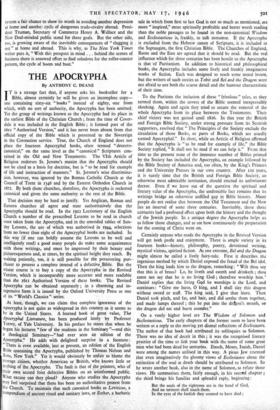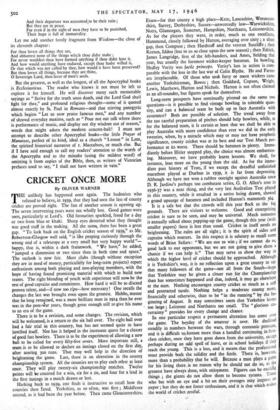THE APOCRYPHA
By ANTHONY C. DEANE
Iis a strange fact that, if anyone asks his bookseller for a 1 Bible, almost certainly he will be given an incomplete copy— one containing sixty-six " books " instead of eighty, one from which, with no sort of authority, the Apocrypha has been omitted. Yet the group of writings known as the Apocrypha had its place in the earliest Bible of the Christian Church ; from the time of Cover- dale it was included in the English Bible ; it formed part of the 1611 "Authorised Version," and it has never been absent from that official copy of the Bible which is presented to the Sovereign in the Coronation service. True, the Church of England does not place the fourteen Apocryphal books, often termed " deutero- canonical," on the same level as the " canonical " Scriptures con- tained in the Old and New Testaments. The VIth Article of Religion endorses St. Jerome's maxim that the Apocrypha should not be cited as a basis for doctrine, but is " to be read for example of life and instruction of 'manners." St. Jerome's wise discrimina- tion, however, was ignored by the Roman Catholic Church at the Council of Trent in 1546 and by the Eastern Orthodox Church in 1672. By both those churches, therefore, the Apocrypha is reckoned canonical and given the same authority as the rest of the Bible.
That decision may be hard to justify. Yet Anglican, Roman and Eastern churches all agree and state authoritatively that the Apocrypha should be read. In the 1922 Lectionary of the English Church a number of the prescribed Lessons to be read in church were taken from the Apocrypha, and in the amended tables of Sun- day Lessons, the use of which was authorised in 1944, selections from no fewer than eight of the Apocryphal books are included. In this way (if one can boldly assume the Lessons to be well and intelligently read) a good many people do make some acquaintance with these writings, and must be impressed by their beauty and picturesqueness and, at times, by the spiritual height they reach. By waiting patiently, too, it is still possible for the persevering pur- • chaser to possess a complete instead of a defective Bible. But the wisest course is to buy a copy of the Apocrypha in the Revised Version, which is incomparably more accurate and more readable than the 1611 Authorised Version of these books. The Revised Apocrypha can be obtained separately ; in a charming and in- expensive form it is issued by the Oxford University Press as one of its "World's Classics series.
At least, though, we can claim that complete ignorance of the Apocrypha is not quite as widespread in this country as it seems to be in the United States. A learned book of great value, The Apocryphal Literature, has been produced lately by Professor Torrey, of Yale University. In his preface he states that when he began his lectures "few of the students in the Seminary "—and this a theological Seminary—" had ever seen an edition of the Apocrypha." He adds with delighted surprise in a footnote: " There is even available, just at present, an edition of the English Bible containing the Apocrypha, published by Thomas Nelson and Sons, New York." Yet it would obviously be unfair to blame the erage citizen, whether American or British, who knows little or nothing of the Apocrypha. The fault is that of the printers, who of their own accord foist defective Bibles on an uninformed public.
What excuse can they plead? Anyone who studies the Apocrypha may feel surprised that there has been no authoritative protest from
the Church. To maintain that such canonical books as Leviticus, a Compendium of ancient ritual and sanitary laws, or Esther, a barbaric
tale in which from first to last God is not so much as mentioned, are more "inspired," more spiritually profitable and better worth reading than the noble passages to be found in the non-canonical Wisdom and Ecclesiasticus is, frankly, to talk nonsense. If the Apocrypha . is excluded from the Hebrew canon of Scripture, it is included in the Septuagint, the first Christian Bible. The Churches of England, Rome and the East are agreed that it should be read. But the real influence which for three centuries has been hostile to the Apocrypha is that of Puritanism. In addition to historical and philosophical books, the Apocrypha includes some lively and frankly imaginative works of fiction. Each was designed to teach some moral lesson, but the writers of such stories as Tobit and Bel and the Dragon were not afraid to use both the coarse detail and the humour characteristic of their time.
To the Puritans the inclusion of these " frivolous " tales, as they termed them, within the covers of the Bible seemed inexpressibly shocking. Again and again they tried to secure the removal of the whole Apocrypha from its place between the Testaments. Their chief victory was not gained until 1826. In that year the British and Foreign Bible Society, under strong pressure from its Scottish supporters, resolved that " The Principles of the Society exclude the circulation of those Books, or parts of Books, which are usually termed Apocryphal." In short, while an Article of Religion affirmed that the Apocrypha is " to be read for example of life," the Bible Society replied, " It shall not be read if we can help it." From that time to the present none of the immense number of Bibles printed by the Society has included the Apocrypha, an example followed by the Bible Society of America and, too often, by the King's Printers and the University Presses in our own country. After 120 years, it is surely time that the British and Foreign Bible Society, an otherwise most admirable institution, should rescind its unfortunate decree. Even if we leave out of the question the spiritual and literary value of the Apocrypha, the undeniable fact remains that its writings bridge an otherwise unfilled gap in Bible history. Many people do not realise that between the Old Testament and the New lies an interval of some three centuries. Inevitably, those three centuries had a profound effect upon both the history and the thought cf the Jewish people. In a unique degree the Apocrypha helps us to follow those changes, and to see how continuously the preparation for the coming of Christ went on.
Certainly anyone who reads the Apocrypha in the Revised Version will get both profit and enjoyment. There is ample variety in its fourteen books—history, philosophy, poetry, devotional writing, mystical visions, spirited fiction. At one extreme, Bel and the Dragon might almost be called a lively fairy-tale. First it describes the ingenious method by which Daniel exposed the fraud of the Bel idol. Then the king leads him to the dragon, remarking : " Wilt thou say that this is of brass? Lo, he liveth and eateth and drinketh ; thou canst not say that he is no living God ; therefore worship him.'
Daniel replies that the living God he worships is the Lord, and continues: " Give me leave, 0 king, and I shall slay this dragon without sword or staff. The king said, I give thee leave. Then Daniel took pitch, and fat, and hair, and did seethe them together, and made lumps thereof ; this he put into the drIgon's mouth, so the dragon did eat and burst asunder."
On a vastly' higher level are The Wisdom of Solomon and Ecclesiasticus. The early chapters of the former seem to have been written as a reply to the moving yet dismal reflections of Ecclesiastes. The author of that book had attributed its soliloquies to Solomon. There was no idea of deceit in this ; it was the recognised literary practice of the time to link your book with the name of some great man who had been dead for centuries. Enoch, Moses, Isaiah, Daniel were among the names utilised in this way. A pious Jew resented that even imaginatively the gloomy views of Ecclesiastes about the extinction of the soul at death should be attributed to Solomon. So he wrote another book, also in the name of Solomon, to refute those views. He summarises them, fairly enough, in his second chapter ; the third brings his familiar and splendid reply, beginning :
But the souls of the righteous are in the hand of God, And no torment shall touch them.
In the eyes of the foolish they seemed to have died ;
And their departure was accounted to be their ruin ; But they are in peace. .
For even if in the sight of men they have to be punished, Their hope is full of immortality.
Let me add another lovely fragment from Wisdom—the close of its eleventh chapter :
For thou lovest all things that are, And abhorrent none of the things which thou didst make ; For never wouldest thou have formed anything if thou didst hate it. And how would anything have endured, except thou hadst willed it, Or that which was not called by thee, how would it have been preserved? But thou lovest all things, because they are thine, 0 Sovereign Lord, thou lover of men's souls.
But the greatest, as well as the longest, of all the Apocryphal books is Ecclesiasticus. The reader who knows it not must be left to explore it for himself. He will discover many such memorable sayings as " Strive for the truth unto death, and the Lord God shall fight for thee," and profound religious thought—some of it quoted almost exactly by St. Paul in Romans—and that stirring panegyric which begins " Let us now praise famous men," and any number of shrewd everyday maxims, such as " Pour not out talk where there is performance of music, and display not thy wisdom out of season," words that might adorn the modern concert-hall! I must not attempt to describe other Apocryphal books—the little Prayer of Manasses, perfect of its kind, ideal as a church " Lesson " in Lent, the spirited historical narrative of a. Maccabees, or much else. But if I have said enough to call my readers' attention to the worth of the Apocrypha and to the mistake (using the mildest word) of omitting it from copies of the Bible, then, as writers of Victorian prefaces used to say, " I shall not have written in vain."































 Previous page
Previous page